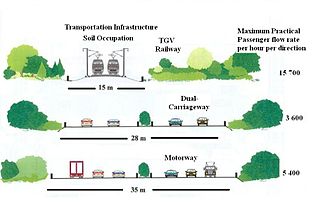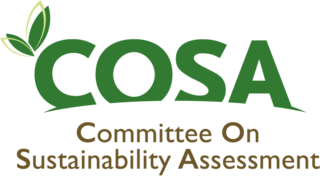
The United Nations Environment Programme (UNEP) is responsible for coordinating responses to environmental issues within the United Nations system. It was established by Maurice Strong, its first director, after the United Nations Conference on the Human Environment in Stockholm in June 1972. Its mandate is to provide leadership, deliver science and develop solutions on a wide range of issues, including climate change, the management of marine and terrestrial ecosystems, and green economic development. The organization also develops international environmental agreements; publishes and promotes environmental science and helps national governments achieve environmental targets.

Sustainable urban infrastructure expands on the concept of urban infrastructure by adding the sustainability element with the expectation of improved and more resilient urban development. In the construction and physical and organizational structures that enable cities to function, sustainability also aims to meet the needs of the present generation without compromising the capabilities of the future generations.
The Deutsche Gesellschaft für Internationale Zusammenarbeit (GIZ) GmbH, often simply shortened to GIZ, is the main German development agency. It is headquartered in Bonn and Eschborn and provides services in the field of international development cooperation and international education work. The organization's self-declared goal is to deliver effective solutions that offer people better prospects and sustainably improve their living conditions.

ICLEI – Local Governments for Sustainability is an international non-governmental organization that promotes sustainable development. ICLEI provides technical consulting to local governments to identify and meet sustainability objectives. It has a strong focus on biodiversity and has worked across local, national, and global levels. ICLEI was the first and is the largest transnational network of local governments engaging in climate action.
Environmental governance (EG) consists of a system of laws, norms, rules, policies and practices that dictate how the board members of an environment related regulatory body should manage and oversee the affairs of any environment related regulatory body which is responsible for ensuring sustainability (sustainable development) and manage all human activities—political, social and economic. Environmental governance includes government, business and civil society, and emphasizes whole system management. To capture this diverse range of elements, environmental governance often employs alternative systems of governance, for example watershed-based management. Obviously, in fact the EG arrangements are very diversed and not at all as inclusive as we could wish them to be.
A Green bond is a fixed-income financial instruments (bond) which is used to fund projects that have positive environmental and/or climate benefits. They follow the Green Bond Principles stated by the International Capital Market Association (ICMA), and the proceeds from the issuance of which are to be used for the pre-specified types of projects.

The Committee on Sustainability Assessment (COSA) is a global consortium of development institutions that work collaboratively to advance sustainability learning with systematic and science-based measurement. COSA applies a pragmatic and collective approach for using scientific methods to develop indicators, tools, and technologies to measure the distinct social, environmental, and economic impacts and are applied in performance monitoring, evaluation, return on investment (ROI) calculation, and impact assessment. COSA has a public mission to open its scientific methods and metrics up to widespread use.
Sustainability standards and certifications are voluntary guidelines used by producers, manufacturers, traders, retailers, and service providers to demonstrate their commitment to good environmental, social, ethical, and food safety practices. There are over 400 such standards across the world.

Urban resilience has conventionally been defined as the "measurable ability of any urban system, with its inhabitants, to maintain continuity through all shocks and stresses, while positively adapting and transforming towards sustainability".

The United Nations Environment Programme Finance Initiative is a partnership between the United Nations Environment Program (UNEP) and the global financial sector to catalyse action across the financial system to align economies with sustainable development. As the UN partner for the finance sector, they convene financial institutions on a voluntary basis to work together with them, and each other, to find practical solutions to overcome the many sustainability challenges facing the world today. UNEP FI does this by providing practical guidance and tools which support institutions in the finance sector to find ways to reshape their businesses and commit to targets for limiting greenhouse gas emissions, protecting nature, promoting a circular economy and supporting financial inclusion to address inequality. The solutions developed effectively form a blueprint for others in the finance sector to tackle similar challenges and evolve their businesses along a sustainable pathway. The creation and adoption of such a blueprint also informs policy makers concerned with sustainability issues about what would constitute appropriate regulation for the finance sector at large. Founded in 1992, UNEP FI was the first organisation to pioneer engagement with the finance sector around sustainability. The Finance Initiative was responsible for incubating the Principles for Responsible Investment and for the development and implementation of UNEP FI’s Principles for Responsible Banking and Principles for Sustainable Insurance as well as the UN-convened net-zero alliances. Today, UNEP FI provides sustainability leadership to more than 400 financial institutions, with assets of well over $80 trillion headquartered around the world.
Catalytic Finance Foundation is a non-profit environmental organization founded in September 2011, by former governor of California, Arnold Schwarzenegger, with the support of the United Nations.Catalytic was later incorporated as a Foundation in 2017 in Geneva, Switzerland, and refined its mission: to accelerate the design and deployment of finance vehicles for sustainable infrastructure at subnational-level. It acts both as 1) a “Climate Infrastructure Funds Incubator” promoting blended financial mechanisms to mobilize capital for projects aiming at achieving the Sustainable Development Goals (SDG), and 2) a climate infrastructure advisor providing technical assistance to improve the bankability of infrastructure projects.

The United Nations Office for Disaster Risk Reduction (UNDRR) was created in December 1999 to ensure the implementation of the International Strategy for Disaster Reduction.

The Climate and Development Knowledge Network (CDKN) works to enhance the quality of life for the poorest and most vulnerable to climate change. CDKN does this by combining research, advisory services and knowledge management in support of locally owned and managed policy processes. It works in partnership with decision-makers in the public, private and non-governmental sectors nationally, regionally and globally.
Climate resilience is a concept to describe how well people or ecosystems are prepared to bounce back from certain climate hazard events. The formal definition of the term is the "capacity of social, economic and ecosystems to cope with a hazardous event or trend or disturbance". For example, climate resilience can be the ability to recover from climate-related shocks such as floods and droughts. Methods of coping include suitable responses to maintain relevant functions of societies and ecosystems. To increase climate resilience means one has to reduce the climate vulnerability of people and countries. Efforts to increase climate resilience include a range of social, economic, technological, and political strategies. They have to be implemented at all scales of society, from local community action all the way to global treaties.

Cities Alliance is a global partnership fighting urban poverty and supporting cities to deliver sustainable development. To manage its activities, the Cities Alliance operates a multi-donor fund with UN Office for Project Services (UNOPS), as host and trustee. Different members provide direction, financing and advocacy. Cities Alliance aims to deliver solutions to urban poverty.
Habitat III, the United Nations Conference on Housing and Sustainable Urban Development, took place in Quito, Ecuador, from 17 – 20 October 2016.

The 2016 United Nations Climate Change Conference was an international meeting of political leaders and activists to discuss environmental issues. It was held in Marrakech, Morocco, on 7–18 November 2016. The conference incorporated the twenty-second Conference of the Parties (COP22), the twelfth meeting of the parties to the Kyoto Protocol (CMP12), and the first meeting of the parties to the Paris Agreement (CMA1). The purpose of the conference was to discuss and implement plans about combatting climate change and to "[demonstrate] to the world that the implementation of the Paris Agreement is underway". Participants work together to come up with global solutions to climate change.
SuRe is a global voluntary standard which integrates key criteria of sustainability and resilience into infrastructure development and upgrade. It has been developed by the Swiss Global Infrastructure Basel Foundation and the French bank Natixis.
The Cities Climate Finance Leadership Alliance (CCFLA) is a coalition of more than sixty organizations actively working to accelerate investment into sustainable infrastructure. The Alliance brings together a wide range of public and private institutions. For example, the Swiss Global Infrastructure Basel Foundation (GIB) is a member of the CCFLA Steering Committee, and occupies the “Research/NGO/Foundations” seat. The Alliance was launched at the United Nations Secretary-General’s Climate Summit in September 2014. In 2016, R20 Regions of Climate Action was elected to lead the Secretariat of CCFLA, partnering with three other organizations: FMDV, UNDP, and UNEP. Climate Policy Initiative became Secretariat of CCFLA in 2019.

Sustainable Development Goal 11, titled "sustainable cities and communities", is one of 17 Sustainable Development Goals established by the United Nations General Assembly in 2015. The official mission of SDG 11 is to "Make cities inclusive, safe, resilient and sustainable". The 17 SDGs take into account that action in one area will affect outcomes in other areas as well, and that development must balance social, economic and environmental sustainability.









